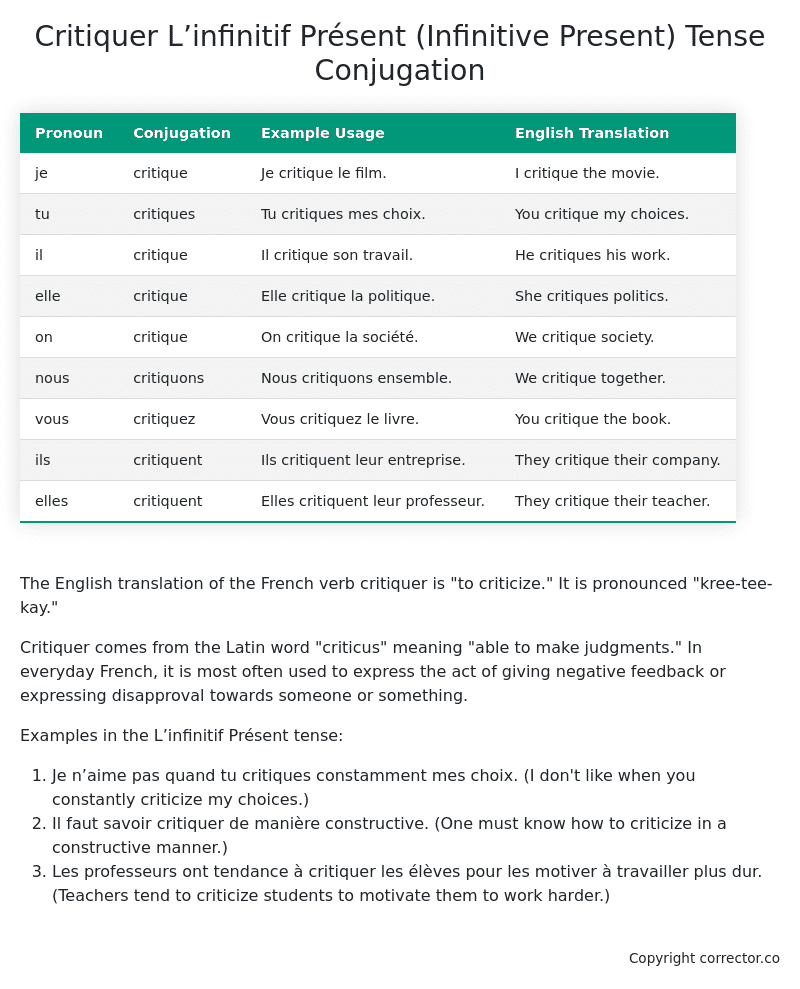L’infinitif Présent (Infinitive Present) Tense Conjugation of the French Verb critiquer
Introduction to the verb critiquer
The English translation of the French verb critiquer is “to criticize.” It is pronounced “kree-tee-kay.”
Critiquer comes from the Latin word “criticus” meaning “able to make judgments.” In everyday French, it is most often used to express the act of giving negative feedback or expressing disapproval towards someone or something.
Examples in the L’infinitif Présent tense:
- Je n’aime pas quand tu critiques constamment mes choix. (I don’t like when you constantly criticize my choices.)
- Il faut savoir critiquer de manière constructive. (One must know how to criticize in a constructive manner.)
- Les professeurs ont tendance à critiquer les élèves pour les motiver à travailler plus dur. (Teachers tend to criticize students to motivate them to work harder.)
Table of the L’infinitif Présent (Infinitive Present) Tense Conjugation of critiquer
| Pronoun | Conjugation | Example Usage | English Translation |
|---|---|---|---|
| je | critique | Je critique le film. | I critique the movie. |
| tu | critiques | Tu critiques mes choix. | You critique my choices. |
| il | critique | Il critique son travail. | He critiques his work. |
| elle | critique | Elle critique la politique. | She critiques politics. |
| on | critique | On critique la société. | We critique society. |
| nous | critiquons | Nous critiquons ensemble. | We critique together. |
| vous | critiquez | Vous critiquez le livre. | You critique the book. |
| ils | critiquent | Ils critiquent leur entreprise. | They critique their company. |
| elles | critiquent | Elles critiquent leur professeur. | They critique their teacher. |
Other Conjugations for Critiquer.
Le Present (Present Tense) Conjugation of the French Verb critiquer
Imparfait (Imperfect) Tense Conjugation of the French Verb critiquer
Passé Simple (Simple Past) Tense Conjugation of the French Verb critiquer
Passé Composé (Present Perfect) Tense Conjugation of the French Verb critiquer
Futur Simple (Simple Future) Tense Conjugation of the French Verb critiquer
Futur Proche (Near Future) Tense Conjugation of the French Verb critiquer
Plus-que-parfait (Pluperfect) Tense Conjugation of the French Verb critiquer
Passé Antérieur (Past Anterior) Tense Conjugation of the French Verb critiquer
Futur Antérieur (Future Anterior) Tense Conjugation of the French Verb critiquer
Subjonctif Présent (Subjunctive Present) Tense Conjugation of the French Verb critiquer
Subjonctif Passé (Subjunctive Past) Tense Conjugation of the French Verb critiquer
Subjonctif Imparfait (Subjunctive Imperfect) Tense Conjugation of the French Verb critiquer
Subjonctif Plus-que-parfait (Subjunctive Pluperfect) Tense Conjugation of the French Verb critiquer
Conditionnel Présent (Conditional Present) Tense Conjugation of the French Verb critiquer
Conditionnel Passé (Conditional Past) Tense Conjugation of the French Verb critiquer
L’impératif Présent (Imperative Present) Tense Conjugation of the French Verb critiquer
L’infinitif Présent (Infinitive Present) Tense Conjugation of the French Verb critiquer (this article)
Struggling with French verbs or the language in general? Why not use our free French Grammar Checker – no registration required!
Get a FREE Download Study Sheet of this Conjugation 🔥
Simply right click the image below, click “save image” and get your free reference for the critiquer L’infinitif Présent tense conjugation!

Critiquer – About the French L’infinitif Présent (Infinitive Present) Tense
Forming the Infinitive Present
Common Everyday Usage Patterns
As a Verb’s Dictionary Form
After Modal Verbs
As an Imperative
In Infinitive Clauses
Interactions with Other Tenses
Present Tense
Future Tense
Conditional Tense
Passé Composé
Imperfect Tense
Subjunctive and Conditional Moods
Summary
Want More?
I hope you enjoyed this article on the verb critiquer. Still in a learning mood? Check out another TOTALLY random French verb conjugation!


